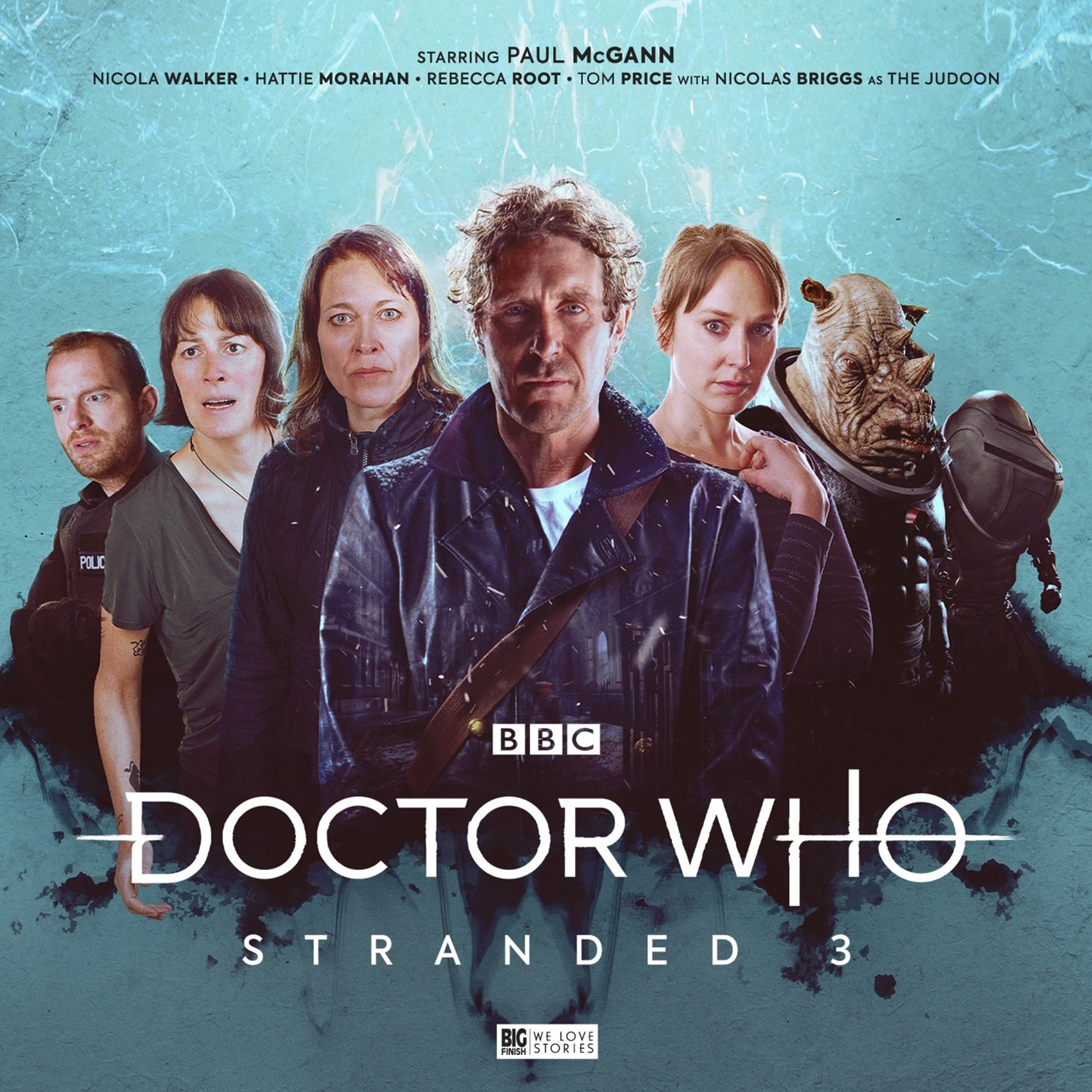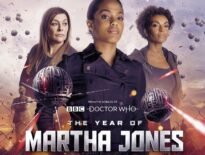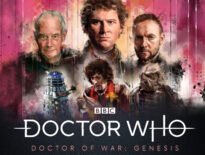As every day goes by, 2022 feels more and more like the third chapter of 2020 that we’re stranded in, and so it’s an appropriate time to listen to the third boxset in the Stranded era of Big Finish’s Eighth Doctor Adventures. And as 2022 is proving, sequels can only get worse, right? Wrong. It gets worse for the characters, but even more rewarding for the listeners.
So with the much-hyped Stranded 4 available now, what happened in Stranded 3?
It follows on almost directly from the previous boxset, meaning you do have to have listened to the preceding eight episodes, with the TARDIS crew exploring the paradoxical timeline created before in Stranded 2 closer, The Long Way Round. Hopping forwards and backwards in this timeline to narrow down where they want to go is pretty much the purpose of this boxset, and it turns the domestic left-behinds on Baker Street into villains, rather than into heroes as the equally domiciliary Russell T Davies era often did.
The first episode is called Patience, and begins with the Doctor climbing a mountain. Maybe an alien mountain. Definitely an alien mountain, because Sergeant Andy Davidson is wearing a Hawaiian shirt and looking up at multiple suns. The twist here? The Doctor, Andy, Liv, Helen, and Tania are fugitives from justice and are certainly not in a position to relax. But on the topic of relaxation, the Doctor once went skinny dipping with Shirley Bassey.
The TARDIS crew have been split up, with Andy and Liv being put together as chalk and cheese while Helen and Tania have a lot of unsaid things they need to discuss as they are paired up to explore the future timeline they are in. Tania and Andy start having visions after a while, and the four become increasingly uneasy and unsure about what’s going on. It’s a slow burner, but by God are the performances of this quartet of companions just absolutely stunning. Hattie Morahan delivers some lines as Helen that feel scarily real such is the suspension of disbelief.
Tim Foley’s script is especially clever and draws the parallel plotlines of the two pairings almost as if it were two sides of a playing card, and that’s before even properly bringing the Doctor and two Judoon into play.
As they are fugitives it makes sense to have the Judoon be the ones chasing them, and the story explores their interpretation of events in addition to the core cast’s, which makes them feel like properly fleshed out characters (played by Nicholas Briggs). As with almost all Judoon appearances in Doctor Who, there’s an element of comedy involved and in this instance it comes in the form of an infant which Andy and Liv have to take care of. A combination that now is truly tested to its limits.

Despite being apart for nearly the duration, Liv and Tania’s relationship is explored in this episode and it’s just a rewarding listen for fans of this cast. Paul McGann sounds enthused as the Doctor too, which is always important given how many years he has been playing this role.
Episode two, Twisted Folklore, is written by Lizzie Hopley and is another great piece of work for the development of the main characters. It takes place on Rarkelia, a world of lizard-like people ruled by humans through purity of thought and a man called the Doctor whose divine teachings tell everyone the way they must live. Divine, like Bad Wolf, is a little motif that goes a long way in the Stranded series.
After learning more about each other with the pairings in episode one, this time the companions are totally split up and the story starts with them embedded into different roles on Rarkelia. Liv is a teacher, who doesn’t quite like the doctrine she’s having to strictly tell children to learn; Tania is part of a killing squad but avoids the killing; Helen is working in a high-end think tank for the galaxy-spanning human empire; and Andy takes a back seat.
Again there’s some really strong performances from the core crew, with their characters given quite different content to usual, and there’s a huge amount of worldbuilding regarding the paradoxical timeline. There’s some early twists, and when the plot starts to race forward, it raises the stakes unbelievably high and in such a brutal way that this boxset does feel mildly depressing with how bad the future it paints a picture of is. There are times where you question whether the interests of the human empire are shared by Helen in particular, and when the Doctor enters proceedings, he helps expose (mostly to the audience) the horror that is to come with the help of a very ill friend.
The episode has a neatly thought out resolution that links back to its very beginning, and leaves the audience in an even less forgiving mood over the horrors dispelled by the human race. It becomes quite easy to start looking at the worst in people as this boxset goes on…
Jumping backwards in the timeline takes the TARDIS to episode three, Snow, which is one big emotional ride. Liv and Tania’s relationship is the starting point here, and there is a really good scene between them to kick things off, while a mystery appears — in 2035, there is snow at the Doctor’s Baker Street flat but nowhere else in the world for the past five years. Living alone for those five years in the house is Ron Winters who shared the house with the Doctor and his companions when they still resided there.
The snow has stayed since Ron’s husband Tony died, and while he still mourns that relationship there is a parallel mourning of Liv and Tania’s. Do either of them die? That would be telling. It would be giving away secrets of James Kettle’s script to reveal any of the reasons why this episode is so utterly heartbreaking for them.
The ‘other Doctor’ from the previous episode appears to be pulling the strings here, despite the time gap, and London in the 2030s has become a de facto fascist state heavy on violence and bigotry. The snow, a bit like the Judoon and the threat of the previous episode, doesn’t really drive the plot and instead exist to the themes of the episode and character development can be explored. In effect, this story is really about learning how to grieve, but at the same time it’s really visual and of course very well acted with a great focus on relationships that would make even the driest eye shed a tear.
John Dorney’s What Just Happened? closes the boxset, and begins with the final credits. Then works backwards from a scene of two of the Doctor’s companions embracing and saying “it’s good to be back”.
First of all, the reverse narrative tactic works incredibly well in episode four and it’s testament to the writer, script editor, and actors that it doesn’t get too confusing, still delivers on its emotional beats, and actually works as a functional story.
It jumps backwards in time every few minutes, with Andy back at the forefront of proceedings again, and there are some major plot teases delivered early on. Miss those and you’re in for a treat by the end, as the characters have a decreasing amount of knowledge about proceedings as they regress.
Even in reverse it’s a really good action story, despite the setups to the dramatic bits happening after said bits for the listener, and once the main villain is revealed, it becomes a reflection on the whole Stranded series too. It ties directly into some major plot points from the second boxset, and explains the paradoxical timeline and resolves it while still leaving room for the fourth boxset to explore more.
Having given his companions a lot of the introspective work in the preceding three stories, the Doctor really has a mirror shown to him here as his morals and the impact of his time on Baker Street come into focus. We’ve already explored how his lifestyle impacts his closest friends, and some of his wider acquaintances in London in previous boxsets, but now it’s firmly stuck to a point where there’s no going back or undoing what has been done. The Doctor has messed up while he’s been stranded in 2020, and the future knows it.
The ending, or the beginning, is both a moment of relaxation (now the pace is slow at what is essentially the start of a story) and also a realisation that an almighty cliffhanger has already been delivered some 40 minutes earlier as one short line of dialogue exposes the Doctor’s big mistake. When the realisation hits, you can only ask, what just happened?



